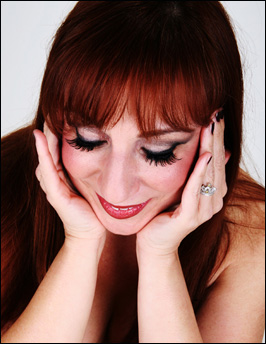Interview with Belly dancer Zahra Zuhair
by SalomeZahra Zuhair has been performing and teaching dances of the Middle East for 25 years. She has produced her own instructional videos as well as the album "Raks Zahra, Cairo Trip Hop Underground" and is founder and director of two dance companies based in Los Angeles, California.
In 1999 Zahra was the recipient of the IAMED Award for Best Modern Egyptian Dancer, and also won the GAMAL Academy of Dance Award for Best Dance Performance on Video in 2001. She has performed throughout the US, UK, and Europe, and teaches on the national circuit.

Salome: Your repertoire includes "the dances of Egypt, Morocco, Tunisia, & Turkey". What style of Oriental or folk dance appeals to you the most and why?
Zahra Zuhair: I love Egyptian oriental dance the most. The music is very inspiring to me, and I find that I can be the most creative when doing that style. The movements feel good on my body, it's natural to me.
Salome: You began personal research tours to Egypt in 1979, and now you lead group tours there. What prompted you to organize tours and what could a dance tourist expect to experience on your tour?
Zahra Zuhair: It never occurred to me to take a group to Egypt until now, because I didn't feel ready to do it. I felt I had too much to learn myself. I spent years not only studying the dance, but developing friendships, & living with my friends in their homes, living their lifestyle.
Of course on my tour we will see the usual tourist sights, dance performances, and take dance classes, but I can give my tour group a better insight on being with the people, and more cultural awareness. I can show people Egypt as an insider, not just a tour guide.
Salome: What are your thoughts on creating a universal vocabulary for Oriental dance?
Zahra Zuhair: I think it's good for basic steps. Oriental movement is easily named by description of the movement, i.e., vertical eight, horizontal eight, etc, or by ballet terms such as arabesque. Past the basics, I don't know that it's really necessary.
Salome: What is the "Po Na Na" Dance Theater about?
Zahra Zuhair: Po Na Na is a North African term loosely meaning, a blend of many things. I started Po Na Na Dance Theater in the early 90's. At that time I felt I needed another creative outlet with oriental dance. I always loved Middle Eastern legends and tales, as well as mythology. I decided to blend oriental music and dance with a storyteller, also using characters, and masks. The Arabic theater tradition began in coffee houses with a storyteller, which is what gave me the idea. I did my first theater production of "Layla and Majnun" (Layla and the Madman), which is a legend that's been around for centuries. It is believed to be a true story and is thought to have taken place somewhere in the western half of the Arabian Peninsula. We did many successful performances of that show.
The next production I did was "The Veils of Inanna", which was based on the Sumerian goddesss Inanna, who was later known by many names in different cultures, Venus, Astarte, Ishtar, and Isis. I am planning on doing another production of Inanna next year.
I find theater very gratifying. It's the most creative outlet for me. I've done everything in my shows from coming up with the concept of the show, to writing the script, choreographing the dances, making all the costumes, to performing.
Salome: How does the "Eshta Dance Company" differ from "Po Na Na"?
Zahra Zuhair: Eshta is the name of my on-going dance company. It is a traditional oriental show, which is designed for entertainment at Middle Eastern weddings, parties, festivals, restaurants, etc. The Eshta dancers are also the Po Na Na dancers, it's one in the same group. However, with the Po Na Na productions, I also have dancers who will join in who aren't in the regular Eshta group, as well solo guest artists. Fahtiem, Sahra Saeeda, Jillina, Robyn Friend, Angelika Nemeth, & Carolyn Krueger to name a few, have all been guests in the Po Na Na productions. The music and choreographies for Po Na Na are designed to tell a story, it's much more theatrical and not traditional like the Eshta show.
I love both venues, they're just different. Dance is in my soul. It's something I have to do to breathe.